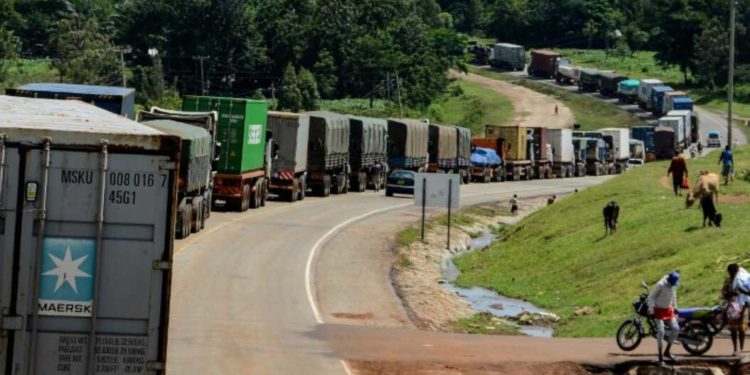All agencies operating at Malaba border post will work round the clock in the coming days in a bid to reduce the long traffic that had stretched for over 38 kilometres on Kenya side by yesterday, chocking the border crossing point.
The Cabinet Secretary (CS) in charge of the East Africa Community and Regional Development Mr, Adan Mohammed directed this in yesterday’s daily briefing by the Ministry of Health on the status of Covid-19 disease in the country.
Agencies charged with the responsibility at the border points include Immigration Department, the Kenya Revenue Authority, Port Health, Border Police Patrol Unit, Kenya Bureau of Standards (KEBS), KEPHIS, among others.
“The congestion, which was blamed on the conduct of a few truck drivers who were said to have blocked the border entry point, is expected to be cleared in the next four or five days,” the CS announced.
The EAC region has been experiencing challenge in having a harmonized testing protocol on Covid-19, where the results from its partner states are in some cases rejected by other countries.
However, the Transport CS James Macharia, also addressing the press gathering reported that the Member Partner States have now agreed on the World Health Organization guidelines on testing protocol to ensure that Covid-19 free certificates will be admitted across the board.
Yesterday, the senate veered into the border delay debate and instructed the Ministry of Transport in Kenya to respond on the emerging issues in the next 7 days. This followed a statement that had been issued in the Senate by Bungoma Senator Moses Wetangula.
Truckers want truck drivers to be assigned testing numbers at Malaba border to avoid long queues and congestion.
Kenya Transporters Association (KTA) said this when it issued a number of resolutions that if implemented by various players involved in transit cargo would ease congestion at Malaba border post and minimize the need for using relay drivers, which is being pushed by the regional transit destination countries.
Among the measures the transporters said to have put in place include prohibition of drivers from carrying any passengers along the corridor. They are also required to use face masks, sanitizers, self-quarantine in truck every time this is possible.
Other measures transporters have adopted include sanitizing trucks after every trip and regularly doing the same in their truck holding yards.
But they said that the use of relay driving, where the truck is handed over to Uganda drivers at the border crossing is more inconveniencing since it will be hard to implement the measure without delays and other associated costs.
“We hereby petition the government to review its position of the proposed plans of relay driving,” the resolutions read in part
The regional road transport and freight forwarding industry led by the Federation of East African Freight Forwarders Associations (FEAFFA), in a petition made recently to the EAC Partner States , observed that they were experiencing challenge of getting equally competent truck drivers across borders due to lack of a harmonized Heavy Goods Vehicle (HGV) professional driver training.
“The levels of exposure to various technologies is posing road safety and asset integrity challenges,” a petition said.
They observed that this would affect smooth operations of handling cargo and once the high costs associated with this are handed over the end users, it will increase the costs of goods and services.
Small and medium sized transporters lacking capacity to mobilize the requisite resources may be driven out of business, the petition said. Also, relay driving will create difficulties in handling insurance claims related to the cargo and the trucks in case of any eventuality, uncertainty on the safety of the cargo, the trucks as well as fuel due to the of involvement multiple drivers.
The region is also pushing for the implementation of a Journey management system (JMS) along the transport corridors to assist in addressing some of the existing challenges brought about by the outbreak of Covid-19 pandemic and especially with the existing impasse being witnessed at the borders. If implemented, the JMS is expected to complement the existing technological interventions within the industry to enhance cargo tracking and promote legitimate trade such as the noble Regional Electronic Cargo Tracking System (RECTS). This will be done through the establishment of designated areas for purposes of testing truck drivers for Covid-19 virus and sharing the driver status through a unique identifier that will be assigned to each truck driver during the initial registration. The JMS system will not require additional gadgets on trucks or use of Smartphones and this is also expected to significantly complement efforts geared towards reduction in the cost of doing business.
For any feedback, contacts us via editorial@feaffa.com / freightlogistics@feaffa.com /info@feaffa.com; Mobile: +254703971679 / +254733780240





